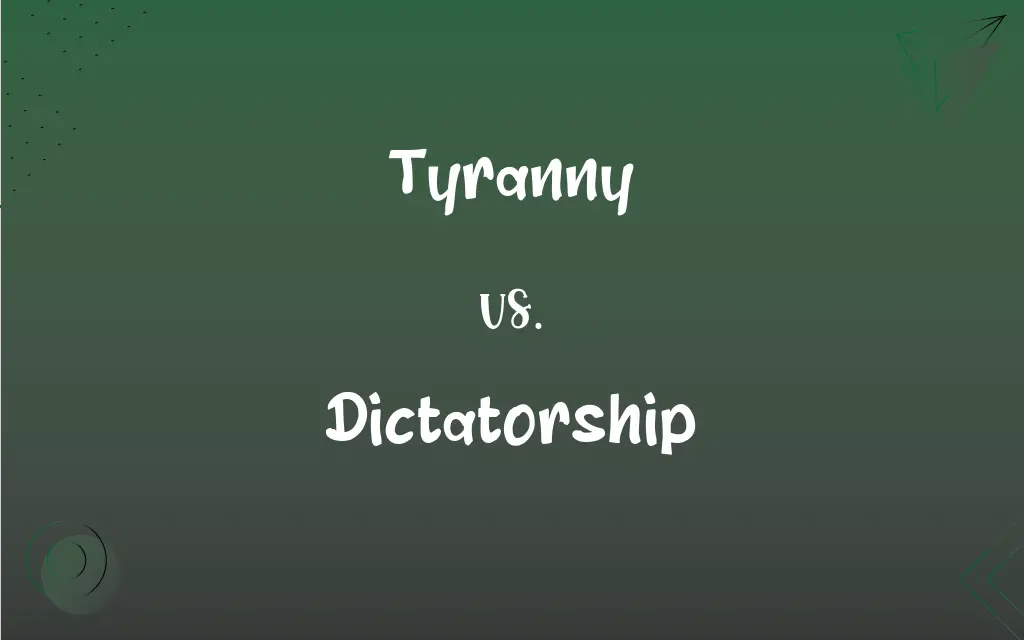Tyranny vs. Dictatorship: What's the Difference?
Edited by Aimie Carlson || By Harlon Moss || Published on October 18, 2024
Tyranny is the cruel and oppressive use of power, while dictatorship is a form of government where a single leader has absolute power.

Key Differences
Tyranny is characterized by oppressive, cruel, and unjust use of power, often in a personal and arbitrary manner. A dictatorship, on the other hand, refers specifically to a form of government where one ruler has absolute authority.
Tyranny can exist in various forms of government and is marked by the tyrant's disregard for the welfare of their subjects. Dictatorships are defined by the concentration of power in one individual or party, often accompanied by the absence of democratic processes.
Tyranny often involves violation of human rights and suppression of dissent. In a dictatorship, these can also occur, but the term is more focused on the structure of governance rather than the morality of the ruler's actions.
Historically, tyranny has been used to describe individual rulers who abused their power, regardless of the government structure. Modern dictatorships, however, are often institutionalized and may include a façade of legal legitimacy.
Tyranny is typically seen as a more personal form of oppressive rule, centered on the character of the tyrant. Dictatorship, while it can be tyrannical, emphasizes the political system granting absolute power to an individual or group.
ADVERTISEMENT
Comparison Chart
Definition
Cruel and oppressive use of power
Government by a ruler with absolute authority
Focus
Characterized by personal abuse of power
Emphasizes the structure of governance
Human Rights
Often involves human rights violations
Can also involve human rights abuses
Historical Context
Describes individual rulers in various government forms
Often institutionalized with a semblance of legality
Nature
Personal and arbitrary
Political, possibly institutionalized
ADVERTISEMENT
Tyranny and Dictatorship Definitions
Tyranny
Tyranny is the oppressive and cruel exercise of power.
The people suffered under the tyranny of the corrupt leader.
Dictatorship
Dictatorship is a form of government ruled by a single leader with absolute power.
The country fell into a dictatorship after the military coup.
Tyranny
It involves a disregard for justice and human rights.
Tyranny often leads to widespread human rights abuses.
Dictatorship
It often lacks democratic processes and political pluralism.
In a dictatorship, elections, if they occur, are usually not free or fair.
Tyranny
Tyranny can be marked by arbitrary decisions and personal rule.
The king's tyranny was evident in his unpredictable policies.
Dictatorship
Dictatorship can lead to suppression of dissent and personal freedoms.
Under the dictatorship, freedom of speech and assembly were restricted.
Tyranny
It is often associated with autocratic and despotic leadership.
His regime was known for its tyranny and despotism.
Dictatorship
It may involve the concentration of power in one party or individual.
The dictator's party held all power, leaving no room for opposition.
Tyranny
Tyranny can manifest in any form of government.
Even in democratic systems, the threat of tyranny exists.
Dictatorship
The office or tenure of a dictator.
Tyranny
Unjust or oppressive governmental power
"He tended to see the Crown as the benign center of the empire and Parliament as the malevolent source of tyranny" (Gordon S. Wood).
Dictatorship
A state or government under dictatorial rule.
Tyranny
A government in which a single ruler is vested with absolute power
People liberated from a brutal tyranny.
Dictatorship
Absolute or despotic control or power.
Dictatorship
A type of government where absolute sovereignty is allotted to an individual or a small clique.
Dictatorship
A government which exercises autocratic rule.
Dictatorship
Any household, institution, or other organization that is run under such sovereignty or autocracy.
Dictatorship
The office, or the term of office, of a dictator; hence, absolute power.
Dictatorship
A form of government in which the ruler is an absolute dictator (not restricted by a constitution or laws or opposition etc.)
Dictatorship
Dictatorships can be institutionalized and sustained through legal frameworks.
The dictatorship maintained its power through a series of oppressive laws.
FAQs
Can a democracy become a tyranny?
Yes, if a leader abuses power and oppresses the people.
Is every dictatorship a tyranny?
Not necessarily, though many dictatorships become tyrannical.
Is tyranny limited to political leaders?
No, it can be exhibited by any authority figure in power.
What is a dictatorship?
A government form where a single leader or party has absolute power.
What are common traits of a tyrant?
Cruelty, oppression, disregard for justice and human rights.
Can tyranny exist in a monarchy?
Yes, if the monarch exercises oppressive and cruel power.
What distinguishes a dictatorship from other forms of government?
The centralization of power in one individual or party, without democratic processes.
What is a military dictatorship?
A dictatorship where the military controls the government and its leader is often a military officer.
Can a dictator be benevolent?
In theory, yes, but absolute power often leads to abuse.
What defines tyranny?
The cruel and oppressive use of power by a ruler.
How does a dictatorship maintain power?
Through control of military, suppression of opposition, and often through a legal framework.
Can a dictatorship have a legal framework?
Yes, many dictatorships create laws to legitimize and maintain their power.
Can tyranny exist in corporate or other non-political settings?
Yes, through oppressive and unjust use of power by leaders in any context.
What is a totalitarian dictatorship?
A form of dictatorship that seeks to control all aspects of public and private life.
How do tyrants typically come to power?
Through force, manipulation, or exploiting weaknesses in political systems.
What role do human rights play in defining tyranny?
The violation of human rights is a key characteristic of tyranny.
How does international law view dictatorships?
It depends on the actions of the dictatorship, particularly regarding human rights.
Can a dictatorship be stable?
It can be temporarily stable, but lack of democratic foundations often leads to instability.
How do citizens suffer under tyranny?
Through loss of freedoms, rights, and often through physical and psychological harm.
How can tyranny be prevented?
Through strong democratic institutions, rule of law, and civic engagement.
About Author
Written by
Harlon MossHarlon is a seasoned quality moderator and accomplished content writer for Difference Wiki. An alumnus of the prestigious University of California, he earned his degree in Computer Science. Leveraging his academic background, Harlon brings a meticulous and informed perspective to his work, ensuring content accuracy and excellence.
Edited by
Aimie CarlsonAimie Carlson, holding a master's degree in English literature, is a fervent English language enthusiast. She lends her writing talents to Difference Wiki, a prominent website that specializes in comparisons, offering readers insightful analyses that both captivate and inform.






































































